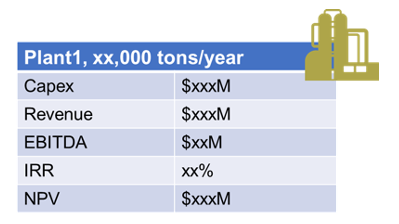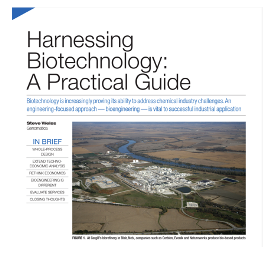Show Me the Economics!: Stand out to investors and partners by tackling their biggest concern upfront
 By Steve Weiss, co-founder of Grey Heron; member, the Due Diligence Wolfpack
By Steve Weiss, co-founder of Grey Heron; member, the Due Diligence Wolfpack
Special to The Digest
In the bioeconomy, you need to compete for attention – of investors, customers, analysts, press, and new hires. It’s not enough to be green, or to trumpet the latest tech: you need to show how and why you can be a real, substantive, impactful business. Stand out by talking about your economics.
For fun: I just looked at ten presentations with over 200 slides from a recent bioeconomy conference. There was lots of ‘we convert X to Y’; ‘we’re sustainable’; or, ‘we’re an Xth generation approach’. In other words, lots of generalities, which makes it hard to stand out. Only one company spoke to its economics (kudos, FluidQuip).
Telling a big picture story will only get you so far. That’s true whether you make sustainable aviation fuel, renewably-sourced hydrogen or ammonia, or new materials; and whether you’re a multi-national or early-stage startup.
Your potential investors, partners and customers have heard that same big picture story many times. To have them take you seriously you need to show that your business makes economic sense. Get away from the conceptual and deliver specifics.
“When people read our reports, they look primarily at three things,” said Steve Slome, Principal at NexantECA, an energy and chemicals advisory company. “Technical feasibility, sound economics, and carbon intensity – does it work, can I make money, and how green is it really.”
Explain how you’ll make money
Many entrepreneurs focus on their innovation: their new way to make a more sustainable product, create a marketplace, or some other advancement. They may also speak to societal benefits like carbon reduction. But your key audiences want to gauge your business’ viability, so you’re well-served by addressing the elephant in the room – economics. That means you need to cover the basics, including:

“Companies need to clearly articulate their investment requirements,” said George Darrah, Principal at climate-tech investor Systemiq Capital. “Having a handle on equity and debt requirements for pilot and commercial facilities is a must.”
Not to be cynical, but people don’t care about your great carbon capture tech, or how you recycle plastics, unless you can convince them it’s plausible you can successfully commercialize. Making these economic arguments clearly and succinctly can help you gain attention for your presentations and to raise capital.
Start with back-of-the-envelope math
A good place to start is with back-of-the-envelope math, to validate your plausibility. If you say (with some supporting evidence) that your product should sell for $5,000 per ton, and you project a total production cost of $2,000 per ton, then that’s potentially interesting to an investor or partner. You’ll boost confidence by showing where you are on that journey – e.g., that your cost is currently $7,000, should be at $4,500 within X months, and that you can describe the anticipated remaining work, time and costs to get to that $2,000 target.
‘Codifying-the-numbers’ doesn’t just apply to your costs and selling price; you also need to be clear about the plausible size of your market opportunity, and therefore potential revenues. It’s great if your product relates to some very large market – but if your value-add is seen as just one small piece of the value stack, then you’re on a path to small-ness. Share your perspective about how many customers you’ll be able to close, and at what average value.
Start with the simple view of your economics
Make it easy for your audiences to understand how your business works. For example, if you need to build an industrial-scale plant to make your product, show the top-level view:

If you already have production facilities, or will have products made for you, focus instead on your model – the selling price, cost of goods sold, sales and marketing costs, and margins.
You can further build credibility by showing you’ve scrutinized how your economics change with shifting market conditions – along with your strategies to maximize outcomes. For example:

Also be sure to highlight additional factors that could impact your economics, like tax credits, carbon intensity, geography, type of feedstock, or public policy. Show the specifics so your key audiences gain confidence in your business.
You can see a deeper discussion of bioeconomy economics, including the use of management dashboards and indifference curves, in my article ‘Harnessing Biotechnology: A Practical Guide’. The more directly you speak to these issues, the more you show that you understand the knobs and dials of your business, which builds credibility and trust.

Yes, you can keep the confidential stuff confidential
You don’t need to reveal your deepest secrets in a public, non-confidential setting. But you do need to give your audiences enough reason to believe your business is worth their time.
One approach is to ‘normalize’ your numbers, by framing them relative to something else. “Our process is already at XX% of the targets we need to be profitable, assuming a market price of X; we should perform well enough to be at economic breakeven in X months; and hit our commercial targets in X months. From there, we’ll continue to improve at X% per year.” Or, “our process technology delivers economics that are in the top XX% of all XX plants worldwide.”
What would the Wolfpack say?

Shown here: the Due Diligence Wolfpack, on-stage at ABLC Next in San Francisco, October 2022
The ‘Due Diligence Wolfpack’ has wrapped up each ABLC bioeconomy leadership conference for years, and participates in deep-dive webinars (disclosure, I’ve been a Wolf since 2019). We’ve tackled bioeconomy topics ranging from methanol and hydrogen, to pivots in corporate strategy (see raucous session of October 2022).
Part of the discipline the Wolfpack applies is ‘does this thing make sense?’, or, colloquially, ‘does this dog hunt?’ Part of that is whether the technology does (or could) work. But the ultimate arbiter is economics. Make it easy for people to want to engage with your company by showing them a strong foundation of economics.
Steve Weiss is co-founder of Grey Heron, a management and strategic marketing consulting firm. Since 1993, the firm has helped executives and investors at over 140 companies build value and become leaders in their sector, through strategy, fundraising, positioning and partnerships. Fields include climatetech, food, advanced materials, cloud/SaaS/AI, and the Internet of Things. Within biotech and renewables, Steve has helped build Genomatica, Oberon Fuels, NovoNutrients, Beta Renewables and Liquid Light (acquired by Avantium), and is a proud member of the Due Diligence Wolfpack. Contact Steve at [email protected]; see Steve’s LinkedIn profile; listen to his “Science of Yes: Positioning and Messaging for Success”.
[1] With acknowledgement to “show me the money” from the movie Jerry Maguire, with Tom Cruise and Renée Zellweger.
Category: Top Stories















